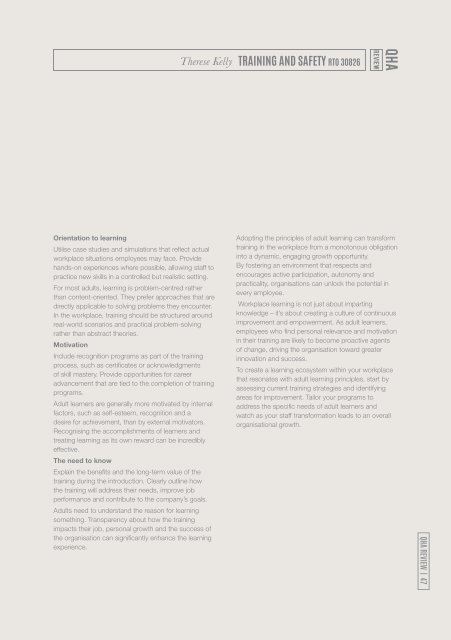QHA-Review_April_Digital
- No tags were found...
Create successful ePaper yourself
Turn your PDF publications into a flip-book with our unique Google optimized e-Paper software.
Therese Kelly<br />
TRAINING AND SAFETY RTO 30826<br />
Orientation to learning<br />
Utilise case studies and simulations that reflect actual<br />
workplace situations employees may face. Provide<br />
hands-on experiences where possible, allowing staff to<br />
practice new skills in a controlled but realistic setting.<br />
For most adults, learning is problem-centred rather<br />
than content-oriented. They prefer approaches that are<br />
directly applicable to solving problems they encounter.<br />
In the workplace, training should be structured around<br />
real-world scenarios and practical problem-solving<br />
rather than abstract theories.<br />
Motivation<br />
Include recognition programs as part of the training<br />
process, such as certificates or acknowledgments<br />
of skill mastery. Provide opportunities for career<br />
advancement that are tied to the completion of training<br />
programs.<br />
Adult learners are generally more motivated by internal<br />
factors, such as self-esteem, recognition and a<br />
desire for achievement, than by external motivators.<br />
Recognising the accomplishments of learners and<br />
treating learning as its own reward can be incredibly<br />
effective.<br />
The need to know<br />
Explain the benefits and the long-term value of the<br />
training during the introduction. Clearly outline how<br />
the training will address their needs, improve job<br />
performance and contribute to the company’s goals.<br />
Adults need to understand the reason for learning<br />
something. Transparency about how the training<br />
impacts their job, personal growth and the success of<br />
the organisation can significantly enhance the learning<br />
experience.<br />
Adopting the principles of adult learning can transform<br />
training in the workplace from a monotonous obligation<br />
into a dynamic, engaging growth opportunity.<br />
By fostering an environment that respects and<br />
encourages active participation, autonomy and<br />
practicality, organisations can unlock the potential in<br />
every employee.<br />
Workplace learning is not just about imparting<br />
knowledge – it’s about creating a culture of continuous<br />
improvement and empowerment. As adult learners,<br />
employees who find personal relevance and motivation<br />
in their training are likely to become proactive agents<br />
of change, driving the organisation toward greater<br />
innovation and success.<br />
To create a learning ecosystem within your workplace<br />
that resonates with adult learning principles, start by<br />
assessing current training strategies and identifying<br />
areas for improvement. Tailor your programs to<br />
address the specific needs of adult learners and<br />
watch as your staff transformation leads to an overall<br />
organisational growth.<br />
<strong>QHA</strong> REVIEW | 47
















